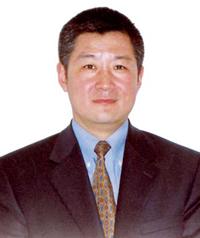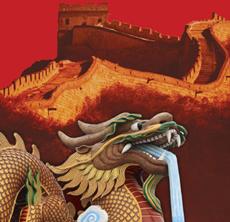“China’s expectations have changed”
30 Jul 2011
 The head of the Tata Sons office in China, James Zhan speaks softly enough to make you strain to catch his words, but he is a hard nut on business matters, with toughness and savvy that augurs well for the Tata group as it sets its sights on expanding its businesses in the world's fastest-growing economy. Mr Zhan worked for 13 years in Hong Kong with Bechtel, the engineering and construction behemoth, before joining the Tata group as head of its Beijing office. Trips to the Tata headquarters in Mumbai and steel city of Jamshedpur were part of his initiation in the group and it opened his eyes in ways he had not quite been expecting. In this interview with Tata Review, the group chief representative, Tata Sons - to give his official designation - speaks about Tata's engagement with China.
The head of the Tata Sons office in China, James Zhan speaks softly enough to make you strain to catch his words, but he is a hard nut on business matters, with toughness and savvy that augurs well for the Tata group as it sets its sights on expanding its businesses in the world's fastest-growing economy. Mr Zhan worked for 13 years in Hong Kong with Bechtel, the engineering and construction behemoth, before joining the Tata group as head of its Beijing office. Trips to the Tata headquarters in Mumbai and steel city of Jamshedpur were part of his initiation in the group and it opened his eyes in ways he had not quite been expecting. In this interview with Tata Review, the group chief representative, Tata Sons - to give his official designation - speaks about Tata's engagement with China.
China is respected for its ability to think big and execute with precision. What, in your opinion, are the opportunities that the Tata group can tap in China?
China is a rapidly growing market for Tata. It has the largest automotive and steel markets in the world and its domestic information technology and business process outsourcing segments are growing rapidly. All of this makes China an attractive proposition for Tata Motors, Tata Steel and Tata Consultancy Services. Also, China has the capability to produce high-quality electronics, machinery and industrial materials for supply, at economical prices, to companies such as Tata Teleservices, Tata Communications, Tata Power, Tata Motors, Tata Steel and Tata Chemicals. At the same time, the Chinese market is extremely competitive. To sell to China you have to compete with well-known international competitors and many fastgrowing and capable Chinese enterprises.
China has access to a huge pool of expatriate talent. In terms of managerial styles and cultures, what are the similarities and differences between Indian managers and their Chinese counterparts?
Indian managers are more outspoken and, generally speaking, their English language skills are better. Chinese managers, on the other hand, are more pragmatic and disciplined, and sometimes very aggressive when setting business targets.
Despite its successes, the Tata group has a relatively limited presence in China. What are the major constraints it faces while doing business in the country?
China's industrial policy is relatively restrictive. Foreign ownership in steel mills is strictly limited, if not banned. Foreign automotive companies can set up manufacturing plants only through joint ventures, with a 50-per cent stake and a minimum investment of $300 million. In less restrictive sectors the major challenges are understanding the Chinese market, its culture and the legal and regulatory environment, not to mention building a capable management team and becoming profitable in the face of competition from strong domestic and international players. China's expectations of multinational corporations and foreign investors have moved to the next level after its rapid economic growth over the past three decades. The government now pursues quality rather than the quantity of foreign investment, and it welcomes foreign companies that are ready to share their experience in business management and technology innovation. The trend is to encourage foreign investment in high-end manufacturing and hightechnology, low-carbon emission and energy-saving industries. This translates into tight restrictions on projects that are polluting or consume too much energy.
What's the status of the new Jaguar Land Rover (JLR) plant in China? How successful has it been in marketing its vehicles in the country?
JLR is in talks with potential Chinese partners to set up a 50-50 joint venture. It needs to select a strong Chinese partner, negotiate a fair commercial deal with this partner and the local government, and obtain central government approvals. JLR has been successful in selling its Land Rover sports utility vehicles and Jaguar sedans in China. We sold more than 26,000 Land Rovers and Jaguars in 2010, which is 80 per cent more than the figure for the previous year. The Chinese consumer's preference for European luxury brands has been a big factor here.
Tata Communications seems to have hit a roadblock in China.
Tata Communications is not giving up on the China market; it is working on a new strategy for the country.
Can you give an idea of what it takes to do business in China?
There's the language issue to begin with, and that's the most immediate and direct challenge. The Tata brand is being recognised in China, but not as much as it is in the UK.
 The Chinese lack adequate knowledge about India and most Chinese companies do not know much about the Tata group. On the other hand, the understanding of Tata companies of Chinese culture, its legal and regulatory edifice and its commercial practices is not consistent.
The Chinese lack adequate knowledge about India and most Chinese companies do not know much about the Tata group. On the other hand, the understanding of Tata companies of Chinese culture, its legal and regulatory edifice and its commercial practices is not consistent.
The Tata experience of China has been limited in terms of learning because the group has been in the country for a relatively short time. That aside, there are not enough Chinese nationals in the various Tata companies in China and very few in senior management positions. The problem, at least partly, has been a high attrition rate that has resulted in key local managers leaving. This has interrupted the accumulation of China experience and institutional knowledge for the Tatas.
(Also see: Tata in China)
(Courtesy: Tata Review)


















